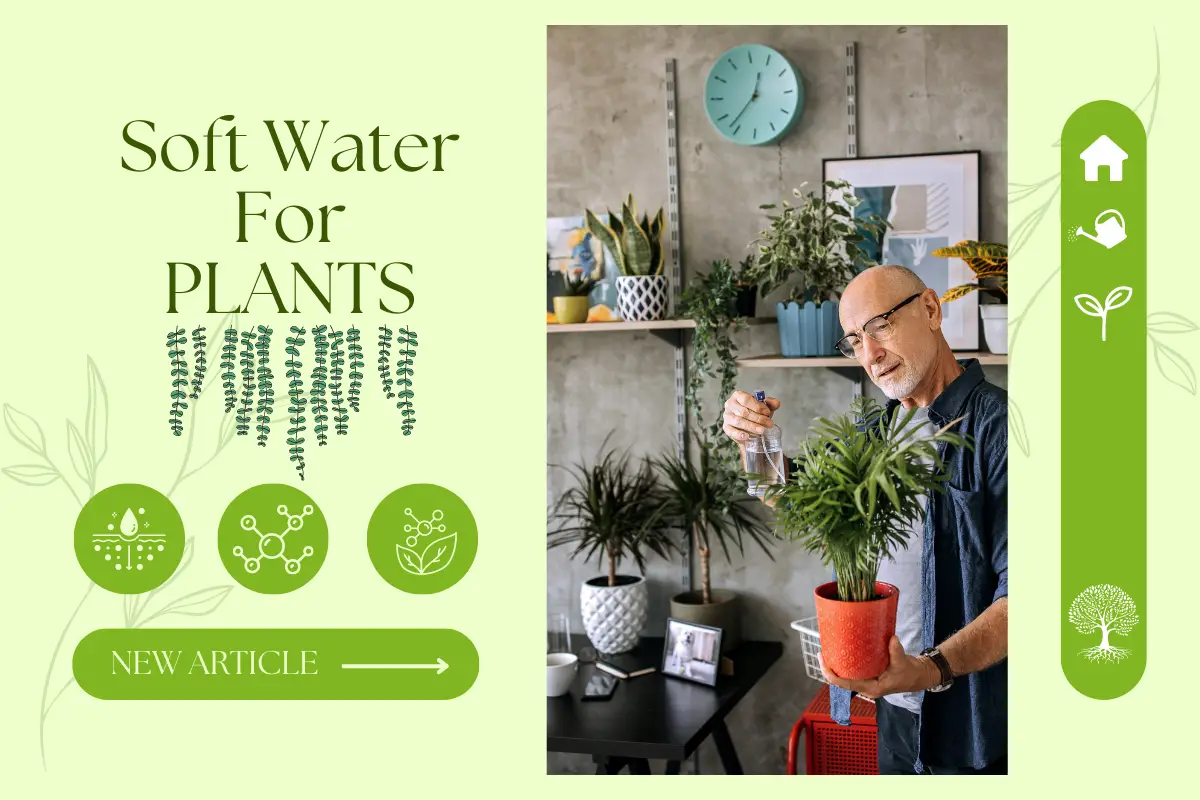One aspect of plant care that is often overlooked is the water used to nourish them. For those with hard water, water softeners are a common solution. While soft water has benefits for household appliances, it may not be the best choice for watering plants.
Softened water contains high amounts of sodium which alters the soil profile and causes plant dehydration. Softened water may be used to water your plants occasionally, but continuous use may kill them. It is recommended to water plants with rainwater or untreated, dechlorinated tap water instead.
In this article, we will delve into the impact of soft water on plants and explore better alternatives for their care.
What Is Soft Water?
Soft water is water that has low concentrations of calcium and magnesium, between 0 to 60 mg/L as classified by the EPA.
Soft water is usually clearer and less soapy to the touch when compared to hard water. It lathers easily with soap and does not leave any scaly deposits.
Hard water – like most well water from underground aquifers – causes scaly buildups on fixtures and appliances due to its hard-mineral content, which is which is why it is chemically softened.
Water Purification Guide has more information on how well water could be killing your plants available here.
In contrast, rainwater is naturally soft, and so is water from rivers. If your water supply is naturally soft, you need not use any chemical softeners.
Hard water may be made softened artificially using salts and other agents. Typically, sodium and potassium salts are used to replace the calcium and magnesium ions in hard water.
Softened water does not leave scaly deposits on your appliances, thereby increasing their longevity. But softened water may not be ideal for your plants or garden.
Soft Water And Its Effect On Plants

The detrimental effects of softened water on plants is caused by the high levels of dissolved sodium salts. When you use softened water on your plants or garden, the sodium readily binds to clay particles and can build up over time.
Plants use the amount of sodium in soil as the metric to determine their water balance. Therefore, too much sodium interferes with the water balance – it tricks plants into thinking they’ve absorbed too much water. This means that your plants will not get enough water despite watering. This may cause plant dehydration over time, eventually leading to plant death.
In addition, too much sodium in your soil seriously impairs soil quality. This creates a harsh bed for new plants, exacerbating the problem. This study by Montana State University sheds light on the ill-effects of overly saline soil.
Using soft water on your garden plants can cause a buildup of salt on the soil surface, especially in areas where rainfall is scarce. This is because there is no natural water to flush it off. This further creates a hostile environment for new plants.
Naturally soft water (such as rainwater) has no ill effects on plants – you may need to use additional nutritional supplements, but there is no harm in using natural soft water. Rainwater has optimal pH for most plants.
Soft water and houseplants
Soft water may be even more harmful for house plants because the soil here is potted. This means that it is easier for sodium to build up in the soil over time. In addition, indoor plants do not reap the benefits of rainwater. So, it is not advisable to use soft water for houseplants.
For indoor plants, you can use RO water instead of water softened with just sodium salts. RO water is more versatile and does not contain as much sodium as chemically softened water. This can aid in plant growth.
Soft water and grass
Grass is more resistant to soft water than other plants. Therefore, grass can tolerate high levels of sodium. However, this does not mean that you exclusively use soft water to water your lawn. Occasionally, soft water is okay, but opt for untreated water instead.
Besides, it is not economical to use chemically softened water on lawns.
Watering delicate air plants
Air plants can require a delicate ecosystem and watering regime to thrive.
Watering air plants involves soaking them in clean bottled or distilled water for 20 to 60 minutes about once a week. It’s very important to dry them off completely by lying them either upside down or on their side – aim to have them completely dry within 2 hours.
The ideal water pH range should be between 5.5 and 6.0, however don’t worry if yours isn’t – your air plant will be just fine.
Softened water is not good for air plants as the sodium salts can burn their leaves.
Hard tap water is also not good for air plants as minerals can build up on their leaves and block their stomata. These are tiny cell structures on their leaves that that allow them to exchange water and gasses with their surrounding environment.
How To Make Soft Water Safe For Plants
The simplest way is to stop softening the water you use on your plants – if your tap water is hard, simply connect a hose to an outdoor tap without running it through a softener. This saves extra softening costs too.
If you already have a softener from the main water line in place, install a bypass valve for the outdoor tap so that you get untreated hard water. Make sure to use only one tap for this so that you don’t risk scaly buildups on other plumbing.
If you use tap water, be sure to dechlorinate it beforehand as too much chlorine can also be detrimental to plant growth.
If possible, opt for natural sources of water for your garden. Rainwater is the best option. Otherwise, use well water or spring water for your plants. This natural water enriches soil and gives your plants just the right nutrition.
Salt-free water softeners don’t remove calcium or magnesium; they are water conditioners that alter these minerals, so they don’t form scale. This means that salt-free water softeners do not add any extra sodium and the water can therefore be used on plants.
However, your plant would still get the same dose of calcium and magnesium. You may run the risk of saturating your soil with calcium and magnesium if you use hard water on your plants over a long period of time.
Diluting softened water
Another way to make soft water safe for plants is to dilute the treated water. Diluting soft water reduces the amount of sodium, making it more conducive to plant health. For this, you can use distilled water or rainwater collected in a water tank, trough or water barrel. The more distilled or rainwater water you mix in, the better.
Do not use pure distilled water directly on your plants either. It can be expensive and, besides, it contains no minerals that are important for plant health.
However, keep in mind that if you do use softened water on your plants, sodium may still build up over time. It is important to monitor the levels of salt and nutrients in your soil periodically.
If you find that your soil is too salty, consider re-potting your plants and giving them a fresh substrate to grow in.
Treating over-salted soil
If you notice your plants looking dehydrated due to soft water, stop using treated water immediately. Opt for untreated water or rainwater instead.
You can also leach the extra sodium from the soil by manually flushing it out – keep in mind that this may take some time. If your soil has good drainage, run untreated water through your soil to flush the sodium out.
Monitor the level of nutrients in the soil and use fertilizer and manure appropriately.
The bottom line
In conclusion, while soft water has its benefits for household appliances, it may not be the best option for watering plants. The high levels of dissolved sodium salts can lead to plant dehydration and compromise soil quality. For optimum plant health, consider using rainwater or untreated, dechlorinated tap water whenever possible.
Additionally, be mindful of the specific needs of different plants. Houseplants and delicate air plants, in particular, require extra care, and using soft water on them can be detrimental.
Ultimately, a simple motto to follow is: “Softened water for your house, unsoftened water for your plants.” By being attentive to your plant’s growth and their response to different watering methods, you can provide them with the best care and ensure they thrive and bring joy to your home for years to come. Happy gardening!

